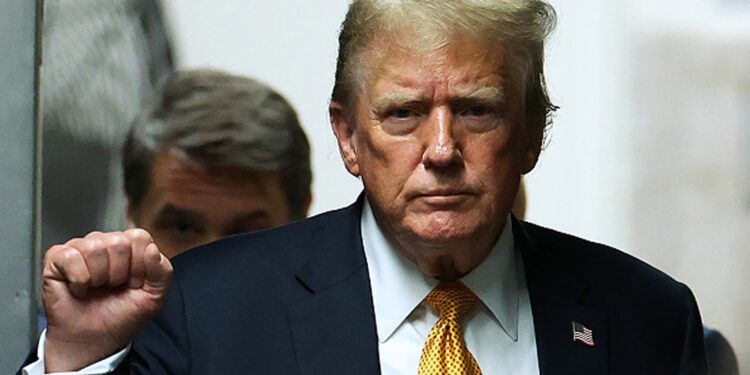Mark Twain is often quoted as having said, “the reports of my death are greatly exaggerated,” in response to a reporter’s inquiry about his health. The authenticity of this quote is debated, yet its essence aptly reflects the media coverage and responses regarding Judge Juan Merchan’s decision to vacate the sentencing date set for November 26 for President-Elect Trump.
Trump was slated to receive his sentence for the 34 felony convictions linked to the case brought forth by Manhattan District Attorney Alvin Bragg (who campaigned on a pledge to “get Trump”), but Judge Merchan has once again postponed the sentencing. The delay was issued to give Trump’s legal team the opportunity to argue for a dismissal based on the Supreme Court’s determination concerning Presidential immunity. This order, however, has sparked unwarranted exaggeration.
“Trump’s Hush Money Sentencing Postponed Indefinitely” declared one headline from CNN. Steven Cheung, who is set to become Trump’s White House Communications Director, jubilantly proclaimed that Merchan’s decision represented a “decisive win for President Trump,” insisting that the “hoax Manhattan Case is now completely stayed and sentencing adjourned.”
Interestingly, Cheung’s use of the term “adjourned” feels more fitting than CNN’s description of it as “postponed indefinitely.” This is simply because all that occurred is that Merchan removed the November 26 sentencing date from the schedule.
While it’s accurate that a new date has not yet been set, it should be noted that failing to establish a wedding date does not imply that the wedding is indefinitely delayed; similarly, Merchan’s lack of a new sentencing date should not be interpreted as an indefinite postponement.
In reality, Merchan’s directive merely permits Trump’s defense team to submit their motion for dismissal, and it clearly outlines a strict timeline for both the defense’s motion (due Dec. 2) and the prosecution’s response (due Dec. 9), while prohibiting any additional reply submissions.

Merchan’s decision to allow a comprehensive briefing of the motion to dismiss is well-founded. Even though many legal analysts believe the Supreme Court’s ruling on immunity won’t lead to the reversal of Trump’s guilty verdicts, it would arguably be imprudent for Merchan to merely push forward.
By facilitating a thorough briefing, the court contributes to a more robust record for future appellate courts. Ultimately, this matter may reach the U.S. Supreme Court, so Merchan has every reason to clarify and substantiate his rationale through a detailed examination by the legal teams. The greater the detail in Merchan’s eventual ruling—assuming the motion to dismiss is denied—the more it restricts potential appeal targets.
D.A. Bragg’s acknowledgment that one potential strategy is to postpone sentencing until after Trump leaves office also plays a role in constructing a comprehensive record. Bragg’s awareness of this possibility further demonstrates that Merchan had various options available to him.
Although many are weary of being consistently let down by Trump’s lack of sentencing, it’s important to recognize that only Bragg and Judge Merchan have managed to bring a prosecution against Trump to a verdict, though that’s not surprising in Manhattan.
Comparatively, the federal cases have stalled to the point where the main issue remaining is whether Trump will successfully remove all of Special Counsel Jack Smith’s team.
In the case regarding documents at Mar-a-Lago, Judge Aileen Cannon has epitomized Trump mentor Roy Cohn’s renowned statement: “Don’t tell me what the law is, tell me who the judge is,” fully validating Trump’s trust in her.
In the D.C. election interference matter, despite the diligent efforts of Judge Tanya Chutkin and the D.C. Circuit, they could not surmount the Supreme Court’s deliberative pace and the time-consuming processes established to assess the scope of Presidential immunity articulated by Chief Justice Roberts’ mock examination of the Constitution.

Debate may ensue regarding whether the Attorney General should be criticized for giving Special Counsel Jack Smith a late commencement, likely leaving Garland’s defenders exasperated, yet it is indisputable that Smith and the DOJ ran out of time.
The Georgia case is entangled in complications that won’t be resolved until well into Trump’s third term. These complications include whether District Attorney Fani Willis will face disqualification due to her connections with Nathan Wade.
Even if the prosecution navigates that obstacle, the Trump Justice Department is likely to argue some form of Supremacy Clause that Trump cannot be prosecuted while in office. If you doubt that, consider that the Deputy Attorney General at the D.O.J. will be among Trump’s defense attorneys, Todd Blanche, and his Principal assistant will be another defense attorney for Trump, Emil Bove.
Regardless of the argument’s validity, it will progress toward the Supreme Court at a pace slow enough that it will consume a considerable part of Trump’s term before a resolution is reached.
Therefore, the ongoing question of “Will Donald Trump face accountability?” will largely depend on the actions and initiatives taken by Judge Merchan and D.A. Alvin Bragg. However, in a broader sense, Steven Cheung’s assertion holds merit—it’s indeed a “decisive victory” for Trump since every case has been delayed, with only one making it to trial before Trump was re-elected. This brings to mind Carrie’s words to Big from the long-ago Season 3 of “Sex and the City”: “We’re so over, we need a new word for over.”


